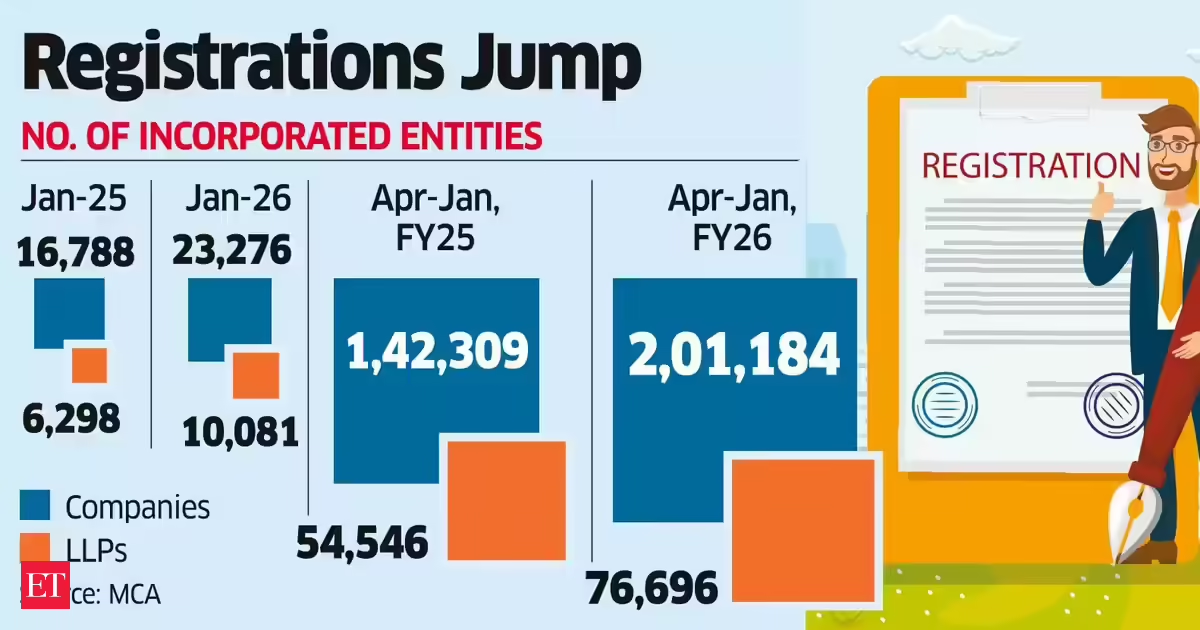Tech
Crypto.com places $70M bet on AI.com domain ahead of Super Bowl

Just in time to create a new Super Bowl ad, Crypto.com founder Kris Marszalek has made the priciest domain purchase in history, buying AI.com for $70 million, according to the Financial Times. The deal, paid entirely in cryptocurrency to an unknown seller, shatters previous records. (Broker Larry Fischer, who facilitated the sale, is presumably celebrating his good fortune.)
Marszalek plans to debut the site during Sunday’s big game, offering consumers a personal AI agent for messaging, app usage, and stock trading. “If you take a long-term view — 10 to 20 years – [AI] is going to be one of the greatest technological waves of our lifetime,” he told the FT.
The purchase rewrites the domain record books — not that crypto industry itself is known for its restraint when it comes to spending. Previously, CarInsurance.com held the crown at $49.7 million (2010), followed by VacationRentals.com ($35 million in 2007) and Voice.com ($30 million in 2019). Other eye-popping sales include PrivateJet.com ($30 million), 360.com ($17 million), and Sex.com, which has sold twice for over $13 million each time, though its second owner went bankrupt trying to monetize it.
“With assets like AI.com, there are no substitutes,” Fischer told the FT. “When one becomes available, the opportunity may never present itself again.”
Whether these mega-dollar domains actually deliver returns remains an open question. But for Marszalek, who already owns Crypto.com and dropped $700 million on stadium naming rights, owning two category-defining domains is apparently worth the outlay.
Tech
Is Car Debadging Illegal In The US? Here’s What You Should Know


A very inexpensive and highly effective small modification you can make to your car, at least from a visual standpoint, is to debadge it. As the name implies, this involves removing the factory badging, typically on the rear hatch or trunk lid. You can either remove all the badging or just the trim level and model designations. As well as cleaning up the rear end and making it look nicer, you can also potentially mask up if you have one of the lower-end powertrains or trim levels for your particular car model, although you shouldn’t be embarrassed about that.
On occasion, some car owners also completely remove the front badging. Whether that means simply removing the badge or installing an aftermarket grille insert without it, a completely badgeless car is not uncommon. For the most part, debadging your car is 100% legal — you won’t face any repercussions for removing the SEL badge from your stock Jetta with GLI bumpers.
Why is it actually legal to debadge a car?
Because the badging on a car’s exterior is purely for marketing and identification, it is completely legal to remove it. Only intentionally removing — or in some cases, adding — badging to make your car look like a different car because of various shady reasons can get you in trouble, but if you’re doing it for cosmetic purposes, you’re totally fine.
Depending on what you drive, it might be a more or less involved process to remove the badges. Most older cars had screwed-in badges, which would require you to unscrew them, but then you’d be left with a cutout for a badge and two screw holes in the bodywork, which would have to be patched up.
Mercifully, most modern cars have glued-on badging; a little bit of heat and a very careful use of a plastic wedge or a string, then another wipe-down should give you that clean, debadged look. Just be careful when removing it, as it’s easy to damage the paint. Some people wax the area after the badging is removed, and you should err on the side of caution with that as well, since it might eat into the clearcoat. If you do decide on the car wax, make sure you get the right one.
Also, don’t get them confused — shaving the bodywork is different from debadging. While debadging simply involves removing all the exterior markings, shaving is often a much more involved process that requires smoothing out areas of the bodywork — often door handles and molding strips — to make them look as if they were never there. In any case, if you do decide to hide the fact that your Civic Si is an Si, you definitely won’t get in trouble with the law.
Tech
Forza, Halo, Gears, and Fable anchor Xbox’s massive 2026 roadmap

Microsoft is preparing one of its most consequential years for Xbox as the platform turns 25, lining up major game releases and platform updates aimed at restoring momentum after a challenging hardware cycle. The company’s internal roadmap centers on four flagship franchises – Forza Horizon 6, Halo: Campaign Evolved, Fable, and Gears of War: E-Day – all targeting 2026 launches and representing a renewed push to unify Xbox’s messaging after years of mixed signals and declining console sales.
Reports indicate Forza Horizon 6 will arrive first on May 19th, with the new Halo reboot tentatively targeting a summer window. Fable and Gears of War: E-Day are slated for the second half of the year, though internal planning includes avoiding overlap with Grand Theft Auto VI, set for November 19th. Alongside the “big four,” Double Fine’s new Kiln game is expected in April, and Bethesda is preparing fresh Starfield content, with long-standing rumors of a PS5 release resurfacing.
A broader year of content, remasters, and long-term platform planning
Beyond first-party tentpoles, Blizzard’s 35th-anniversary roadmap includes new updates for World of Warcraft, Overwatch, Hearthstone, and Diablo, while fans continue to speculate about remasters of Fallout 3 and Fallout: New Vegas. Bethesda is reportedly polishing its Fallout 3 remaster carefully following the positive reception to the surprise Oblivion remaster.

But 2026 isn’t only about games – it’s a reset year for Xbox hardware and software strategy. After Asus’ launch of Xbox-aligned handhelds last year, the new Xbox Ally X will debut AI-powered features like Automatic Super Resolution and AI-generated highlight reels. A redesigned Xbox PC UI is also in development, unifying console, PC, and cloud experiences with smoother animations and a new floating guide.
Industry watchers expect more clarity at GDC
This is where Microsoft traditionally outlines developer tools and long-term platform direction. While no new console will launch in 2026, AMD confirmed that work on the next-gen Xbox – built on a new semi-custom SoC – is progressing toward a 2027 release.

Microsoft’s aggressive 2026 lineup signals an effort to stabilize the Xbox brand after years of uncertainty, leaning on legacy franchises while reshaping its ecosystem around PC, cloud, and third-party hardware. New next-gen controllers with Wi-Fi cloud connectivity, refreshed Xbox special editions, and early testing for ad-supported free cloud gaming are all designed to grow the platform beyond traditional console boundaries.
By the end of 2026, Xbox fans should have a clearer view of how Microsoft intends to steer the brand through its next quarter-century – and whether this ambitious slate can rekindle trust and enthusiasm across the broader gaming community.
Tech
Cyber Talent Shortage? This Alabama Pathway Might Be the Solution

When Seth Walker first walked into Lincoln High School’s new cybersecurity class, he felt out of place. “I didn’t have any IT experience, and everyone else seemed so far ahead of me,” he remembered. “So, I let that motivate me to learn the craft and keep up.”
His curiosity led him from a rural high school in Talladega, Alabama, to Troy University, where he’s studying cybersecurity and working on his CompTIA Security+ certification as a freshman. He credits high school internships and mentorship from his teacher, Brian Kelly, as the foundation that shaped his path forward. “I saw firsthand how cybersecurity looks in different environments,” Walker said. “It made me realize this is something I can really build a future in.”
A Regional Model for Rural Readiness
In 2023, Talladega County Schools joined Digital Promise’s inaugural Cybersecurity Pathways Cohort, part of a national effort to build regional workforce pipelines in high-demand tech fields. Soon after, the district joined neighboring Talladega City, Anniston City, Etowah County, Oxford City, St. Clair County and Sylacauga City school districts to form the East Alabama Regional Cybersecurity Alliance (EARCA), a collaboration with post-secondary institutions and industry partners in East Alabama working to grow local cybersecurity talent.
Together, the group created a student-centered Cybersecurity pathway reaching more than 33,000 students. EARCA is becoming a replicable model for regional pathways, offering shared curriculum, teacher professional development and employer partnerships that can be adapted anywhere.
The alliance strengthens the local economy by connecting education directly to employment, and preparing students for an evolving tech landscape where cybersecurity and artificial intelligence intersect. With 8,000 unfilled cybersecurity jobs in Alabama and 750,000 vacancies nationwide, schools like Lincoln High are preparing students for roles that pay an average of $90,000 annually, according to the U.S. Bureau of Labor Statistics.
“The cybersecurity pathway gives students a clear direction and a chance to stay and work here in Alabama,” said Darian Simmons, career tech director at Talladega City Schools.
Building a Program From the Ground Up
For Kelly, the instructor who launched Lincoln High’s program, cyber had long been an interest. “I worked in IT doing help desk and network support, and always wanted to integrate cybersecurity,” he said. “When the opportunity came up to run the program, I jumped on it.”
Kelly saw this as a chance to hone his own skills as well. “My advice to other teachers is to just jump in. The more you’re exposed to AI and cybersecurity, the more comfortable you get. Learn with your students. Do the competitions. Figure it out together.”
This is the philosophy that shapes his classroom environment. Students work in small groups to solve problems together before turning to him for help. “That’s what cybersecurity is: creative problem-solving,” he said. Competitions like CyberPatriot and SkillsUSA keep students motivated and build confidence in their skill set.
Hands-On Learning and Flexible Tools
One memorable project for Walker involved a rubber ducky, a small, programmable USB drive that can access a device remotely. “It showed us how something simple can be powerful,” he said. “The same process can be used for harm or protection, so it all comes down to intent.”
Students also use IBM SkillsBuild, a free platform offering self-paced courses and micro-credentials in cybersecurity, AI and digital literacy for teachers and students. For Walker, it was a turning point. “It was my best friend in that first semester,” he said. “There is no better foundation for hardware, networking and software basics.”
Kelly values the self-paced design for giving students flexibility and teachers built-in professional development.
From PD to Practice
Through EARCA, Kelly meets monthly with other cybersecurity teachers for professional learning and resource sharing. The sessions create a community of practice where educators share lesson ideas, test labs and align their teaching with workforce needs.
At Lincoln High, Kelly turns those shared strategies into hands-on learning. His students analyze phishing emails, design defense strategies and complete local internships that connect classroom skills to careers.
The lessons from Alabama echo in other regions. In Kansas City, full-stack instructor Shineta Horton applies similar principles through her own professional learning. “If we want students to use technology ethically and creatively, teachers have to feel confident exploring it first,” she said. “They see me learning as we navigate SkillsBuild together, and that changes everything.”
Both Kelly and Horton agree: career readiness extends beyond technical know-how. “The tools will continue to change,” Kelly said, “but adaptability, communication and persistence are what carry students forward.”
“Everyone should have access to this kind of learning,” added Walker. “It opens so many doors.”
Lessons for Educators
The EARCA model offers insights for schools expanding career readiness opportunities:
- Start small and learn together. Teachers don’t need to be experts; learning alongside students builds trust and confidence.
- Connect with the community. Partnering with local businesses gives students exposure to how AI and cybersecurity operate in different settings.
- Leverage free resources. Platforms like SkillsBuild provide accessible pathways for both professional development and student engagement.
Looking Ahead
For Kelly, the growth of the cybersecurity program represents a shift in mindset as much as curriculum. “We’re showing students that technology careers aren’t somewhere else,” he said. “They can build them right here in Alabama.”
For Walker, what once felt intimidating now feels essential. “Cybersecurity gives me a way to make a difference,” he said. “It’s not just about technology, it’s about protecting people.”
The story of East Alabama offers a blueprint for others: a regional alliance of schools and employers creating student-centered career pathways and a resilient local economy through education and collaboration.
Tech
‘The Mandalorian and Grogu,’ 50 Cent and More of the Biggest Super Bowl 2026 Ads So Far

If you’re watching Super Bowl LX live right now, you’re in for another epic run of ads. Besides seeing the Seahawks vs. Patriots matchup, we are taking in movie teasers, funny app promos (looking at you, Ben Stiller) and food commercials on our TVs (or phone). The night isn’t done yet, so be ready for more companies to crank out their campaigns.
We’ve gathered a small roundup for you — including those featuring artificial intelligence and Supergirl’s pop-up for Puppy Bowl. While some of these are full-length commercials meant to make you laugh, feel inspired or question what’s creepy, some are short teasers that will pique your curiosity (hey there, Jigglypuff).
Get into The Mandalorian and Grogu, Ken (without Barbie), 50 Cent and much more, and stick with us all night for even more Big Game ad reveals.
Watch this: What’s the Best Way to Stream Super Bowl LX?
The Mandalorian and Grogu
In a short Big Game teaser clip, The Mandalorian and Grogu trek through the snow, reminding us “the journey never gets any easier.”
Supergirl for the Puppy Bowl
Okay, so this isn’t an official gameday ad, but Supergirl showed up for the Puppy Bowl today, and DC dropped a teaser for the movie due out June 26.
Liquid Death’s exploding heads
No, it’s not an episode of The Boys. Liquid Death’s new spot aims to blow your mind with its energy drink — but without losing your head.
DoorDash and 50 Cent’s ‘beef’
Follow 50 Cent on Instagram, and at any moment, you’ll catch him trolling some of his famous peers — mostly to their detriment. This DoorDash gameday ad makes fun of his reputation for beefing with people (with a slick joke about Diddy), while he schools us on the “art of delivering beef.” Take notes.
Manscaped serenade
You’ll have to watch this for yourself and arrive at your own conclusion, but we’re only posting the short version here. Head to YouTube for the extended cut.
Southwest Airlines pokes fun at seating chaos
You know the airline recently switched to assigned seating, and this timely SB commercial jokingly looks back at the mayhem of an era before the new policy.
Scream 7
It’s the return of Sidney Prescott, Ghostface and a fan theory about Stu with this new, flame-filled big-game trailer that makes Sidney’s daughter a target. The movie arrives in theaters Feb. 27.
Google Gemini helps design a dream home
Google adds a human touch to showcase its Gemini AI assistant in this SB spot, where a little kid is genuinely excited to dream up what his new home will look like — including a place for his pup.
Oakley Meta AI glasses
Marshawn Lynch is among the stars in Oakley Meta’s first Super Bowl ad that will debut this Sunday. Check out how the AI-powered glasses capture what Sky Brown, Sunny Choi, IShowSpeed, Spike Lee, Kate Courtney and Akshay Bhatia are doing on and off the ground.
Anthropic throws shade at AI competition
We’ve covered how this Claude ad from Anthropic takes shots at OpenAI and its plans to test ads, but Dr. Dre’s What’s The Difference playing in the background kind of nails the message’s tone, in case it wasn’t clear.
Dairy Queen’s Taylor and Swift
It’s a play on words in this DQ spot starring Tyrod Taylor and D’Andre Swift that’s urging fans to order platters for their own halftime snack breaks.
Backstreet Boys for T-Mobile
A T-Mobile store performance from the Backstreet Boys earns tears from Druski, and a couple of cameos from Machine Gun Kelly and The Wrong Paris actor Pierson Fodé.
State Farm teaser livin’ on a prayer
Danny McBride and Keegan-Michael Key rep “Halfway There Insurance” and serenade Hailee Steinfeld in this comedic teaser for State Farm’s ad. The girl group Katseye also makes a brief appearance.
Xfinity’s Wi-Fi saves Jurassic Park?
Xfinity goes the full nostalgia route in its Jurassic Park-themed Super Bowl ad starring Jeff Goldblum, Laura Dern and Sam Neill, where Xfinity stops the dino disaster at the park from ever happening.
Melissa McCarthy in an e.l.f. telenovela
Dramatic. Glamorous. High stakes. Melissa McCarthy. What more can you ask for in a gameday ad/telenovela?
Eos fragrance x Netflix fake-out
In a nod to Netflix’s Is It Cake, this body spray spot from Eos has contestants guessing if the scent is real or if it’s coming from a dessert.
Uber Eats: Matthew McConaughey annoys Bradley Cooper
Uber Eats is back for this year’s Super Bowl LX ad run, and Eagles fan Bradley Cooper isn’t trying to hear what Matthew McConaughey has to say about… food. Will they come to blows? Check out Jerry Rice, Parker Posey and a few other celeb cameos.
Pepsi nabs a polar bear
We’ve seen polar bears working as mascots for years for one particular cola brand, but Pepsi’s blind taste test for this bear has it feeling disloyal.
Super freaky Svedka Vodka
Vodka brand Svedka has used robots in its ads before, but the company hits a couple of firsts with this commercial, which is soundtracked by Rick James’ Super Freak. It’s the first time a vodka ad has rolled out during the Super Bowl in 30 years, and it’s the first brand to use mostly AI to create its ad.
Pokemon’s big anniversary
Who’s hitting the big 3-0? Pokemon! In honor of the franchise turning 30, the company is dropping a new Super Bowl ad to jumpstart a year-long celebration. Jigglypuff is the only star in this teaser, but don’t be surprised if you catch more Pokemon in Sunday’s full ad.
Be a hero with Ring
Ring reminds us that pets are truly family with its tender new ad that showcases its Search Party feature. AI tech to help find and reunite lost pets? Sounds like a win.
Ken travels solo with Expedia
No, Barbie isn’t tagging along with Ken on his jet-setting travel adventures. But he does have Expedia every step of the way in this gameday spot that may be one of our favorites this year. Go, Ken!
Toyota’s superhero belt
Not all commercials are made to be chaotic or cameo-filled surprises, and Toyota’s spot marries nostalgia, family and charm in this tender ad for the RAV4.
Kinder Bueno brings babies and merciful aliens together
Actor William Fichtner commands a space center in this Kinder Bueno ad with intergalactic travel, astronaut babies and cute little aliens that spare the planet for one reason.
Chris Hemsworth is creeped out by Alexa Plus AI
If you haven’t been able to picture Chris Hemsworth afraid of anything, here’s your chance to see how he reacts to Alex Plus in his home. Amazon’s AI assistant works hard to prove its worth and trustworthiness in this ad.
Instacart in its disco era
Instacart recruited Ben Stiller and Benson Boone as disco-loving performers for a series of Super Bowl commercials to introduce its new app feature: Pick bananas the way you like them. Look out for these harmonizing brothers to drop another fresh ad during the big game.
Liquid I.V. and EJae of KPop Demon Hunters
Singer EJae goes a cappella with a version of Against All Odds in this Liquid I.V. teaser dubbed as a Tiny Vanity Concert. Who can’t relate to singing in front of a mirror? The full ad will go live for game week.
Squarespace doesn’t want you to lose it
A laptop doesn’t stand a chance against Emma Stone in the Squarespace spot titled Unavailable. Stone and Yorgos Lanthimos team up in this black-and-white ad directed by Lanthimos, where the actor destroys a few laptops over the domain name emmastone.com being unavailable.
Pringles x Sabrina Carpenter
Sabrina’s new man is constructed entirely out of Pringles in the full Super Bowl spot for the stackable chip brand. He’s tall and mustached, but is he too much of a snack? You’ll have to watch yourself to see if the pop star and her edible lover last.
Budweiser rings in a milestone
The beer brand gets sentimental in celebration of its 150th anniversary this year, and this ad features a Budweiser horse mascot taking flight. (No, that’s not Pegasus.)
Tree Hut
Tree Hut is known for its sugar scrubs and other body care products, and this goopy ad redefines what a smear campaign can look like.
Hims on rich people
Opening with a few lines and images about rich people and health care, this Super Bowl ad from Hims — narrated by Common — asks you to consider your own wellness.
Grubhub teases money… and food
Grubhub has delivered on its promise to “put their mouth where their money is” — and it’s not just about the food. Listen to what George Clooney has to say.
Fanatics Sportsbook and Kardashian Kurse
OK, technically Kendall Jenner isn’t a Kardashian, but you get the drift — and the rumors — with this cheeky Super Bowl ad from Fanatics Sportsbook, a sports betting platform.
Oikos powers you up
Kathryn Hahn impressively pushes a trolley uphill in this Oikos ad that also features Derrick Henry.
Michelob Ultra and Kurt Russell’s wisdom
Ante up for Kurt Russell and Lewis Pullman hitting the slopes in the newest Michelob Ultra big game spot, which also features two Olympians: T.J. Oshie and Chloe Kim.
Nerds hang with Andy Cohen
It might be weird seeing Andy Cohen outside of his Bravo hosting duties and trading banter with Real Housewives of any city, but here he is. Nerds Candy suits up and hits the red carpet with Cohen in this SB spot.
Bud Light keg roll
In this commercial, wedding attendees go after a Bud Light keg in a slow-motion scramble set to Whitney Houston’s I Will Always Love You. It’s Post Malone, Shane Gillis and Peyton Manning versus a particularly steep hill.
Universal Orlando Resort wants to change everything
Through the lens of four different visitors (and ads), the theme park is launching a campaign called This Changes Everything to encourage guests to take “transformative” vacations. You can follow one family in this “Lil’ Bro” Super Bowl spot.
Chris Stapleton and Traveller Whiskey make a moment
The singer strikes a chord in this whiskey ad, recalling Stapleton’s past Super Bowl performance when he was tapped to sing the National Anthem.
Too salty to party with Ritz?
This spot transports viewers to Ritz Island, but this isn’t a reference to the popular reality franchise, Love Island (as far as we can tell). Jon Hamm and Bowen Yang observe a party — and tantalizing Ritz crackers — from afar. They end up joining the function with a bit of help from Scarlett Johansson.
YouTube TV: Don’t support what’s ‘Meh’
Jason and Kylie Kelce contemplate the worst aspects of a world filled with meh in this ad for YouTube TV.
Lay’s potato tear-jerker
Who knew a potato chip ad could be so softhearted? It’s a family affair when it comes to farming potatoes, and sweet memories line the way to retirement.
Volkswagen wants you to jump around
You know what? Hell yeah to House of Pain’s Jump Around, no matter the context. In the VW Big Game ad, the auto company beckons you to get out, get up and get around.
Turbo Tax drama with Adrien Brody
To ease everyone into our least-favorite time of year, Adrien Brody acknowledges that death and taxes are sure things for us, but do they need to be painful?
Tech
M5 Max Mac Studio & New Studio Display could finally arrive in the spring

Apple’s Mac desktop lineup should get M5 variants and the Studio Display may finally get its long-awaited upgrade just after M5 Pro and Max MacBook Pros arrive. Here’s what to expect, and when.

Mac Studio and Studio Display could be updated soon
Apple Silicon has been on a fairly predictable near-annual update cycle, which means the Mac lineup gets updated at a similar cadence. While some chips are short-cycled, others take just a bit longer, which seems to be the case for the Mac Studio in 2026.
According to the Power On newsletter from Mark Gurman, Apple will release the Mac Studio and Studio Display “not long after” the spring Mac updates. The Mac mini is also expected to get an update in 2026 as well.
Rumor Score: 🤯 Likely
Continue Reading on AppleInsider | Discuss on our Forums
Tech
KPMG asked its own auditor for a discount, citing AI efficiencies


The negotiations, which took place last year, signal how deeply automation is beginning to influence professional services markets that have long been defined by human labor. For decades, audit pricing has reflected time, expertise, and regulatory complexity. Now, tools powered by machine learning and generative AI are changing that calculus.
Read Entire Article
Source link
Tech
TechCrunch Mobility: Is $16B enough to build a profitable robotaxi business?

Welcome back to TechCrunch Mobility — your central hub for news and insights on the future of transportation. To get this in your inbox, sign up here for free — just click TechCrunch Mobility!
Waymo’s acceleration over the past 18 months is undeniable. The Alphabet-owned self-driving company now operates commercial robotaxi services in six markets, including the San Francisco Bay Area, Phoenix, Los Angeles, Austin, Atlanta, and Miami. It has plans to grow its fleet of driverless taxicabs this year to more than a dozen new cities internationally, including London and Tokyo.
And now it has $16 billion to fuel that expansion. Is it enough?
Talking to a few industry watchers, the answer kept landing in the squishy “sort of” and “it depends” territory.
First the bull case. Alphabet is clearly committed to ensuring Waymo’s success; the parent company is, and continues to be, the primary investor. Which means Waymo isn’t exposed like other AV startups that suddenly lost funding after their backers (often legacy automakers) got skittish or pivoted.
Its ridership and autonomous miles driven stats are also exploding and will likely continue in that trajectory unless it is derailed by regulators. (Waymo provides 400,000 rides every week across six major U.S. metropolitan areas, and in 2025 alone, it more than tripled its annual volume to 15 million rides.)
This doesn’t guarantee success, though, especially if the gauge is set to profitability. Waymo still must solve several problems, including cost and increasing attention from regulators (the company’s chief safety officer just testified in a Senate Commerce hearing). If Waymo wants to simply be the licensor of its AV tech, it will have to move away from being the operator, which means giving up some control. That’s hard with a nascent technology under scrutiny.
Techcrunch event
Boston, MA
|
June 23, 2026
And while some of you will fight me on this, it also lacks the in-house manufacturing that Tesla has. Yes, Waymo has automotive partners. But it doesn’t come with the same financial leverage or ability to drive down costs with scale.
Disagree? Send your argument to my email at kirsten.korosec@techcrunch.com.
A little bird

The investors behind the now-defunct EV startup Canoo were always mysterious — in fact, they were only revealed as part of a lawsuit. Six years ago, I received a tip to look into one of them in particular: David Stern. He had connections to Prince Andrew but was otherwise a ghost.
He was on my mind, though, as the Department of Justice started releasing its files on Jeffrey Epstein. My curiosity as to whether he would turn up in the documents was quickly overwhelmed by the fact that he was, in fact, a close business partner of the convicted sex offender. He brought Epstein investment opportunities from around the world, and in particular, pitched him on investing in Faraday Future, Lucid Motors, and Canoo during the go-go days of mobility funding. Read my story on Stern and Epstein’s relationship and how mobility startups were once in the mix.
— Sean O’Kane
Got a tip for us? Email Kirsten Korosec at kirsten.korosec@techcrunch.com or my Signal at kkorosec.07, or email Sean O’Kane at sean.okane@techcrunch.com.
Deals!

Autonomous vehicle technology is about more than just robotaxis — it is a difficult and costly business that only a handful of well-capitalized companies like Tesla, Waymo, and Zoox are pursuing. Many startup founders are applying the AV systems they’ve developed to other use cases, including off-road defense, trucking, forklifts, mining, and construction. Investors, anxious about missing out on the AV party, are jumping into these sectors.
Bedrock Robotics is the latest example of investor interest. The Silicon Valley autonomous vehicle technology startup, founded by veterans of Waymo and Segment, are developing a self-driving system that can be retrofitted onto construction equipment. And it just raised $270 million in Series B funding co-led by CapitalG and the Valor Atreides AI Fund. Other investors include Xora, 8VC, Eclipse, Emergence Capital, Perry Creek Capital, NVentures (Nvidia’s venture capital arm), Tishman Speyer, Massachusetts Institute of Technology, Georgian, Incharge Capital, C4 Ventures, and others.
Bedrock raised more than $350 million in a short time (the company was formed in 2024). And while that might not seem like a lot compared to the size of some seed rounds in the AI labs sector, it shows money is flowing into physical AI startups. I expect more deal flow; importantly I expect the startups focused on practical applications of automated driving systems to attract talent — if they can afford them. Bedrock, for instance, hired Vincent Gonguet, who previously led AI safety and alignment at Meta for all Llama models, as its head of evaluation. It also hired John Chu away from Waymo.
Keep an eye out for my interview with Bedrock Robotics co-founder and CEO Boris Sofman.
Other deals that got my attention this week …
German electric motor maker Additive Drives raised €25 million ($29.5 million) from Nordic Alpha Partners.
Autonomous underwater vehicles startup Apeiron Labs closed a $9.5 million Series A round led by Dyne Ventures, RA Capital Management Planetary Health, and S2G Investments. Assembly Ventures, Bay Bridge Ventures, and TFX Capital participated.
GoCab, the African mobility fintech startup, raised a $45 million financing round comprising $15 million in equity and $30 million in debt. The equity round was co-led by E3 Capital and Janngo Capital, with participation from KawiSafi Ventures and Cur8 Capital.
Mitra EV, a commercial EV fleet company in Los Angeles, raised $27 million in financing, including equity funding from lead investor Ultra Capital and a credit facility from S2G Investments.
Overland AI, a Seattle-based developer of self-driving systems designed for military operations, raised $100 million in a round led by 8VC. Other investors included Point72 Ventures, Ascend Venture Capital, Shasta Ventures, Overmatch Ventures, Valor Equity Partners, and StepStone Group.
Plug, the used EV marketplace, raised $20 million in a Series A led by Lightspeed with participation from Galvanize and existing investors Autotech Ventures, Leap Forward Ventures, and Renn Global.
R3 Robotics, a European startup that wants to automate the disassembly of EV systems at scale, raised €20 million ($23.6 million) in combination of grants and venture funding. The €14 million ($16.5 million) Series A funding was co-led by HG Ventures and Suma Capital. Oetker Collection, the European Innovation Council Fund (EIC Fund), and existing shareholders, including BONVENTURE, FlixFounders, and EIT Urban Mobility also participated.
Skyryse, an El Segundo, California-based aviation automation startup, has raised more than $300 million in a Series C investment. The round, led by Autopilot Ventures, pushes its valuation to $1.15 billion. Other investors include Fidelity Management & Research Company, ArrowMark Partners, Atreides Management LP, BAM Elevate, Baron Capital Group, Durable Capital Partners, Positive Sum, Qatar Investment Authority, RCM Private Markets Fund managed by Rokos Capital Management, and Woodline Partners.
Notable reads and other tidbits

China has banned concealed electronically actuated door handles popularized by Tesla. The ruling, published by China’s Ministry of Industry and Information Technology, says all new cars sold in the country must have mechanical releases on their door handles by January 1, 2027. There is chatter that Europe could soon follow.
Uber continues to make moves designed to make it competitive in the autonomous vehicle sector. The company has promoted Balaji Krishnamurthy, its VP of strategic finance and investor relations, to be its CFO. This may not seem connected to AVs, but it is. Krishnamurthy actively promotes the company’s autonomous ride-hailing partnerships and has a board seat at AV company Waabi. During the company’s Q4 call, he talked about AVs, saying the company would invest capital in its AV software partners, work with AV makers by investing equity or via offtake agreements, and “support our AV infrastructure partners.”
Meanwhile, a high-profile lawsuit against Uber has delivered a mixed verdict for the ride-hailing company, which was sued after a woman alleged she was raped by her Uber driver in November 2023. A jury determined Uber was liable as an apparent agent of the driver and awarded $8.5 million to the plaintiff. The jury rejected claims that Uber was liable for negligence or design defects and declined to award punitive damages. An Uber spokesperson, who emailed TechCrunch a statement, said the “verdict affirms that Uber acted responsibly and has invested meaningfully in rider safety. We will continue to put safety at the heart of everything we do.” Uber plans to appeal the decision.
One more thing …
Last week in our newsletter, we did a poll asking what the name or ticker of Elon Musk’s combined supercompany should be. Thanks to those who emailed their suggestions, many of which had space themes, like Galactic X (great one). As for the poll, the majority picked plain ol’ X.
That makes sense, considering Musk has often talked, and posted, about X, the everything app. About 50% voted for X, while 20.7% picked ELON, 17.2% selected SpaceAI, and 12.1% chose K2, a reference to one of the corporate entities created in January.
My pick? I think it will ultimately be X, and the company will include more than just SpaceX and xAI.
To participate in our polls, sign up for our newsletter!
Tech
For $4,550, Would You Buy a Single Premium Watch or a Swarm of Affordable Ones?

To be a viable alternative to our GADA Tudor, the value collection has to include a travel-time watch. We looked at Farer’s 36-mm Lander IV, with its preppy color scheme and distinctive character, but ultimately we went for another cult favorite from the affordable end of the Swatch Group stable.
The Mido Ocean Star Decompression Worldtimer costs $5 less than the Farer, at $1,490, and brings its own eye-catching dial to the table, as well as a 200-meter water resistance rating and a version of the same 80-hour movement as in the Hamilton. Perhaps the clincher was the world-time bezel, which shouldn’t be confused with a true mechanical world-time complication, but does give at-a-glance timekeeping around the world.
So far we’ve spent $3,905, which means we still have $645 burning a hole in our pocket. The obvious gap in this collection is a chronograph of some kind. It would give us the decisive edge over the Black Bay, but for this budget most mechanical chronographs are out of reach. We could buy a MoonSwatch—in fact, at $285 we could buy two and have enough left for the Uber home—but we’re on our mission to find something more substantial, more interesting, and (let’s face it) more likely to stand the test of time.
And that something is the Brew Super Metric ($475), a hybrid mecha-quartz chrono from a New York microbrand with more personality than every MoonSwatch put together. The unashamedly loud retro styling isn’t for everyone, but we think that the cushion-shaped case and steel bracelet help broaden our stylistic options, and although it’s not a pedigree mechanical chronograph, it costs less than $500 while looking and feeling like no one’s idea of a compromise.
That brings the challengers to a grand total of $4,380, which means we’d be able to buy a six-watch case to keep our collection in (of course it’s got space for one more …) and maybe even a couple of spare straps.
There’s no doubt the Tudor is in a different league, but could a crack squad of specialists tempt you to part with $4,550? Or will the lure of singular luxe prove too tempting? Over to you. It’s decision time.
Tech
The final trailer for Project Hail Mary is here and it’s an emotional ride

Amazon MGM just released the final trailer for its upcoming film starring Ryan Gosling, Project Hail Mary, and it provides our first good look at his five-legged alien co-star, Rocky. The movie adapts a 2021 Andy Weir (The Martian) novel of the same name, and follows Dr. Ryland Grace, a scientist who wakes up on a spacecraft far from Earth with no recollection of how he got there or why, only to discover he’s on a seemingly impossible mission to stop an extinction event.
If you’ve read the book, you already know we’re in for an emotional rollercoaster with this one, and the latest trailer aptly tugs at our heartstrings with a glimpse of the friendship that grows between Grace and an alien he meets after waking up — and the incredibly high stakes they’re facing. The movie will be released nationwide on March 20, but Amazon announced alongside this trailer that it’ll be offering tickets for early screenings in premium formats including IMAX, Dolby Cinema, 4DX and 70MM to Prime members. Those screenings will begin on March 16, and tickets go on sale February 20 through Fandango.
Tech
CISA is ordering US federal agencies to remove outdated routers and firewalls


CISA has ordered all civilian federal agencies to identify and remove “end-of-support” hardware and software that vendors no longer patch or maintain. The new directive, known as Binding Operational Directive 26-02, is part of an aggressive overhaul aimed at closing one of the most persistent security gaps in federal IT:…
Read Entire Article
Source link
-

 Video6 days ago
Video6 days agoWhen Money Enters #motivation #mindset #selfimprovement
-

 Tech5 days ago
Tech5 days agoWikipedia volunteers spent years cataloging AI tells. Now there’s a plugin to avoid them.
-

 Politics7 days ago
Politics7 days agoSky News Presenter Criticises Lord Mandelson As Greedy And Duplicitous
-

 Politics9 hours ago
Politics9 hours agoWhy Israel is blocking foreign journalists from entering
-

 Sports2 days ago
Sports2 days agoJD Vance booed as Team USA enters Winter Olympics opening ceremony
-

 Tech2 days ago
Tech2 days agoFirst multi-coronavirus vaccine enters human testing, built on UW Medicine technology
-

 NewsBeat4 hours ago
NewsBeat4 hours agoWinter Olympics 2026: Team GB’s Mia Brookes through to snowboard big air final, and curling pair beat Italy
-

 NewsBeat6 days ago
NewsBeat6 days agoUS-brokered Russia-Ukraine talks are resuming this week
-

 Business9 hours ago
Business9 hours agoLLP registrations cross 10,000 mark for first time in Jan
-

 Politics11 hours ago
Politics11 hours agoThe Health Dangers Of Browning Your Food
-
Sports2 days ago
Former Viking Enters Hall of Fame
-

 Crypto World7 days ago
Crypto World7 days agoMarket Analysis: GBP/USD Retreats From Highs As EUR/GBP Enters Holding Pattern
-
Sports3 days ago
New and Huge Defender Enter Vikings’ Mock Draft Orbit
-

 Business16 hours ago
Business16 hours agoJulius Baer CEO calls for Swiss public register of rogue bankers to protect reputation
-

 NewsBeat3 days ago
NewsBeat3 days agoSavannah Guthrie’s mother’s blood was found on porch of home, police confirm as search enters sixth day: Live
-

 Business3 days ago
Business3 days agoQuiz enters administration for third time
-

 Sports7 days ago
Sports7 days agoShannon Birchard enters Canadian curling history with sixth Scotties title
-

 NewsBeat7 days ago
NewsBeat7 days agoGAME to close all standalone stores in the UK after it enters administration
-

 NewsBeat4 days ago
NewsBeat4 days agoStill time to enter Bolton News’ Best Hairdresser 2026 competition
-

 NewsBeat2 days ago
NewsBeat2 days agoDriving instructor urges all learners to do 1 check before entering roundabout






